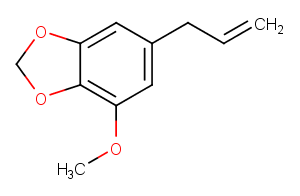Myristicin
| Code | Size | Price |
|---|
| TAR-T9113-1mg | 1mg | £95.00 | |||||||||||||||||||||||||||||||||||||||||||||||||||||||||||||||||||||||||||||||||||||||||||||||||
| Special offer! Add £1 to your order to get a TargetMol CCK-8 Kit. Read more here. | |||||||||||||||||||||||||||||||||||||||||||||||||||||||||||||||||||||||||||||||||||||||||||||||||||
Quantity:
| TAR-T9113-5mg | 5mg | £128.00 | |||||||||||||||||||||||||||||||||||||||||||||||||||||||||||||||||||||||||||||||||||||||||||||||||
| Special offer! Add £1 to your order to get a TargetMol CCK-8 Kit. Read more here. | |||||||||||||||||||||||||||||||||||||||||||||||||||||||||||||||||||||||||||||||||||||||||||||||||||
Quantity:
| TAR-T9113-1mL | 1 mL * 10 mM (in DMSO) | £134.00 | |||||||||||||||||||||||||||||||||||||||||||||||||||||||||||||||||||||||||||||||||||||||||||||||||
| Special offer! Add £1 to your order to get a TargetMol CCK-8 Kit. Read more here. | |||||||||||||||||||||||||||||||||||||||||||||||||||||||||||||||||||||||||||||||||||||||||||||||||||
Quantity:
| TAR-T9113-10mg | 10mg | £148.00 | |||||||||||||||||||||||||||||||||||||||||||||||||||||||||||||||||||||||||||||||||||||||||||||||||
| Special offer! Add £1 to your order to get a TargetMol CCK-8 Kit. Read more here. | |||||||||||||||||||||||||||||||||||||||||||||||||||||||||||||||||||||||||||||||||||||||||||||||||||
Quantity:
| TAR-T9113-25mg | 25mg | £201.00 | |||||||||||||||||||||||||||||||||||||||||||||||||||||||||||||||||||||||||||||||||||||||||||||||||
| Special offer! Add £1 to your order to get a TargetMol CCK-8 Kit. Read more here. | |||||||||||||||||||||||||||||||||||||||||||||||||||||||||||||||||||||||||||||||||||||||||||||||||||
Quantity:
| TAR-T9113-50mg | 50mg | £262.00 | |||||||||||||||||||||||||||||||||||||||||||||||||||||||||||||||||||||||||||||||||||||||||||||||||
| Special offer! Add £1 to your order to get a TargetMol CCK-8 Kit. Read more here. | |||||||||||||||||||||||||||||||||||||||||||||||||||||||||||||||||||||||||||||||||||||||||||||||||||
Quantity:
| TAR-T9113-100mg | 100mg | £358.00 | |||||||||||||||||||||||||||||||||||||||||||||||||||||||||||||||||||||||||||||||||||||||||||||||||
| Special offer! Add £1 to your order to get a TargetMol CCK-8 Kit. Read more here. | |||||||||||||||||||||||||||||||||||||||||||||||||||||||||||||||||||||||||||||||||||||||||||||||||||
Quantity:
Prices exclude any Taxes / VAT
Overview
Regulatory Status: RUO
Shipping:
cool pack
Storage:
-20℃
Images
Documents
Further Information
Bioactivity:
Myristicin is a natural product found in spices and umbelliferous plants. Myristicin has anti-cholinergic, antibacterial, and hepatoprotective effects, it also has anti-inflammatory properties related with its inhibition of NO, cytokines,chemokines, and growth factors in dsRNA-stimulated macrophages via the calcium pathway. Myristicin may antagonize the anxiolytic effects of midazolam, increase anxiety, and affect motor movements. Myristicin can induce apoptosis as characterised by alterations in the mitochondrial membrane potential, cytochrome c release, caspase-3 activation, PARP-cleavage and DNA fragmentation.
CAS:
607-91-0
Formula:
C11H12O3
Molecular Weight:
192.214
Pathway:
Neuroscience; Immunology/Inflammation; GPCR/G Protein; Membrane transporter/Ion channel; Microbiology/Virology; Proteases/Proteasome; Apoptosis; Metabolism; Chromatin/Epigenetic; DNA Damage/DNA Repair
Purity:
0.9934
SMILES:
COc1cc(CC=C)cc2OCOc12
Target:
IL Receptor; Anti-infection; BCL; P45; PARP; 5-HT Receptor; Caspase; GABA Receptor; NO Synthase



